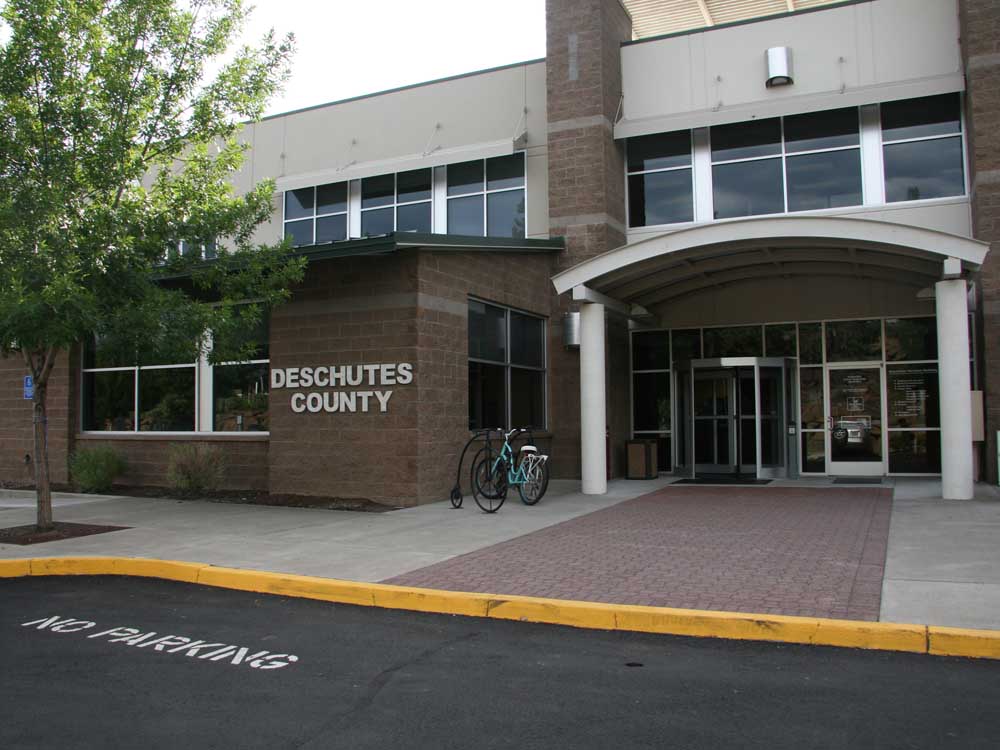County land sale proceeds splits Deschutes County Commission
Published 6:30 pm Wednesday, October 13, 2021

- Deschutes County administration building in Bend.
A split Deschutes County Commission decided against putting $1 million toward affordable housing projects, instead finding the money would be better spent toward expanding the courthouse.
On Wednesday, the Deschutes County Commission discussed whether the county’s property manager should move forward with handling the documents associated with the sale of county-owned property at the corner of NE 27th Street and NE Conners Avenue.
The county is selling the land to the affordable housing organization Housing Works, which will provide roughly 30 to 40 additional affordable housing units and will have space for Mosaic Medical to provide clinical service to vulnerable populations, according to county documents. Construction is estimated to be done by 2024.
During that discussion, Commissioner Phil Chang proposed the commission use $1 million it would be receiving from the sale of 1.14 acres of county land in Bend to leverage affordable housing projects.
Chang has advocated that the county donate the land instead of selling it, which the county has done in the past for other affordable housing-related projects. But if it has to be sold, Chang said the county should dedicate the proceeds to other affordable housing projects.
“It’s an urgent need in our community, and this is a critical time where we could be catching up a little bit with affordable housing rather than fall further and further behind,” Chang said Wednesday.
But Commission Chair Tony DeBone and Commissioner Patti Adair disagreed and argued that the proceeds would be better spent going toward the costs of a long -term plan to expand the courthouse.
Because of this disagreement, Chang voted against moving forward with executing documents related to the sale.
Adair said paying for the courthouse expansion is a direct responsibility of the county, and doing it sooner rather than later is important in order to keep construction costs down.
“That project can’t be held off,” Adair said.
Chang said his colleagues were presenting a false choice, and that there is enough money to finance the courthouse expansion and put this $1 million toward affordable housing.
Chang also challenged the idea that allocating the sale proceeds to affordable housing would delay courthouse expansion plans, and assigned blame instead to previous commissions for not finalizing design plans sooner in anticipation of expansion needs.
“If we had arrived with a design, we could be under construction right now,” Chang said.
DeBone said in general he supports efforts to provide more “starter homes” in Deschutes County, but traced affordable housing issues back to Bend’s urban growth boundary expansion process in 2016, which he said took too long and is now causing issues.
Chang said blaming the state land use system for housing struggles is a distraction from the problem.
“The problem is we don’t have enough money to build infrastructure and affordable housing,” Chang said.
Another reason Chang advocated for using the money for affordable housing is because $900,000 of the $1 million the county will be receiving will be coming from the city of Bend’s affordable housing funding. Housing Works is paying the remaining $100,000 from its own reserves.
Bend city Councilor Barb Campbell has publicly criticized the county for pulling resources from the city’s affordable housing program during a City Council meeting last week, and in an email said the money could have gone toward more housing projects.
“The City of Bend’s Affordable Housing Advisory Committee and the Affordable Housing Fund are recognized Statewide as powerful forces for good,” Campbell wrote in an email sent to county commissioners last week. “The Deschutes County Commission is undermining that good work, pulling funds away from the problems.”






